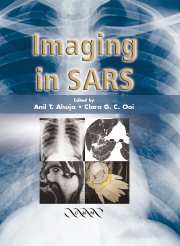Book contents
- Frontmatter
- Contents
- Contributors
- Preface
- 1 The Epidemiology of Severe Acute Respiratory Syndrome: A Global Perspective
- 2 The Role of Emergency Medicine in Screening SARS Patients
- 3 Severe Acute Respiratory Syndrome Outbreak in a University Hospital in Hong Kong
- 4 Imaging of Pneumonias
- 5 The Role of Chest Radiographs in the Diagnosis of SARS
- 6 Chest Radiography: Clinical Correlation and Its Role in the Management of Severe Acute Respiratory Syndrome
- 7 The Role of High-Resolution Computed Tomography in Diagnosis of SARS
- 8 The Role of Imaging in the Follow-up of SARS
- 9 Treatment of Severe Acute Respiratory Syndrome
- 10 SARS in the Intensive Care Unit
- 11 Imaging of Pneumonia in Children
- 12 Imaging and Clinical Management of Paediatric SARS
- 13 Imaging of SARS in North America
- 14 Radiographers' Perspective in the Outbreak of SARS
- 15 Implementation of Measures to Prevent the Spread of SARS in a Radiology Department
- 16 Aftermath of SARS
- 17 Update on Severe Acute Respiratory Syndrome
- Index
16 - Aftermath of SARS
Published online by Cambridge University Press: 27 October 2009
- Frontmatter
- Contents
- Contributors
- Preface
- 1 The Epidemiology of Severe Acute Respiratory Syndrome: A Global Perspective
- 2 The Role of Emergency Medicine in Screening SARS Patients
- 3 Severe Acute Respiratory Syndrome Outbreak in a University Hospital in Hong Kong
- 4 Imaging of Pneumonias
- 5 The Role of Chest Radiographs in the Diagnosis of SARS
- 6 Chest Radiography: Clinical Correlation and Its Role in the Management of Severe Acute Respiratory Syndrome
- 7 The Role of High-Resolution Computed Tomography in Diagnosis of SARS
- 8 The Role of Imaging in the Follow-up of SARS
- 9 Treatment of Severe Acute Respiratory Syndrome
- 10 SARS in the Intensive Care Unit
- 11 Imaging of Pneumonia in Children
- 12 Imaging and Clinical Management of Paediatric SARS
- 13 Imaging of SARS in North America
- 14 Radiographers' Perspective in the Outbreak of SARS
- 15 Implementation of Measures to Prevent the Spread of SARS in a Radiology Department
- 16 Aftermath of SARS
- 17 Update on Severe Acute Respiratory Syndrome
- Index
Summary
Introduction
This chapter briefly examines:
the weaknesses in the health care systems exposed by the severe acute respiratory syndrome (SARS) epidemic in Hong Kong,
the sequelae of the disease.
Audits
Two audit committees, set up by the Hong Kong Government and Hospital Authority respectively, reviewed the response of the health systems to the SARS epidemic. The findings of both audits were similar. The main criticism were that:
Government agencies were not prepared for an outbreak of such magnitude. Procedural mechanisms were not in place beforehand so agencies were always trying to catch up.
Information about an unusual viral infection in early February 2003 only had the status of rumour and early ‘soft’ evidence was neglected.
Not enough was done early in the epidemic to alert other hospitals and health care workers of potential risks. And when information was disseminated it was not very clearly communicated.
The following recommendations were made:
Effective surveillance, data collection and sharing
High level of awareness and implementation of effective infection control measures.
Rapid and comprehensive contact tracing.
Timely declaration and enforcement of isolation and quarantine measures.
Both the audits were comprehensive, clearly identified the deficiencies and made suitable recommen dations for future improvement.
- Type
- Chapter
- Information
- Imaging in SARS , pp. 159 - 164Publisher: Cambridge University PressPrint publication year: 2004



